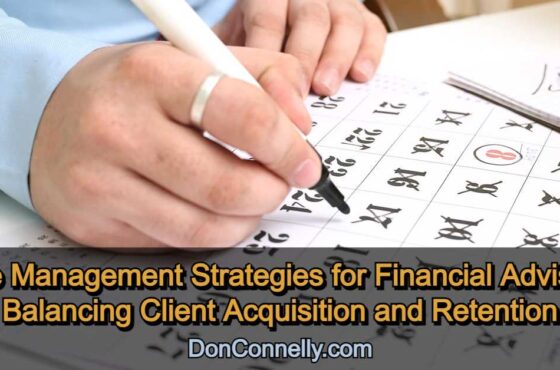Finding the Right Mentor
 Financial advisors must bring with them some essential traits. They need to be ambitious, courageous and thrive on hard work. That’s just the minimum required to survive the early years. From there, the learning curve is steep, with much to learn—technical and analytical skills, product knowledge, and critical soft skills—all while riding a wild rollercoaster of ups and downs. Those who choose to go it alone struggle mightily to get to the next level. But those who develop a successful relationship with the right mentor often flourish.
Financial advisors must bring with them some essential traits. They need to be ambitious, courageous and thrive on hard work. That’s just the minimum required to survive the early years. From there, the learning curve is steep, with much to learn—technical and analytical skills, product knowledge, and critical soft skills—all while riding a wild rollercoaster of ups and downs. Those who choose to go it alone struggle mightily to get to the next level. But those who develop a successful relationship with the right mentor often flourish.
Mentors are vital to financial advisors’ growth and development, helping them achieve all their goals and prepare them to face even the harshest of markets with equanimity.
A mentor relationship offers many distinct benefits, including:
One-on-one, specialized training. Mentors are there for you, working on skill sets and practice management tools specific to your needs.
An expanded network. A well-connected mentor can open new doors for you, enabling you to develop new networking circles.
Improved soft skills. Soft skills are the more difficult yet more critical skills advisors must learn to be successful. Observing mentors in action while getting immediate feedback on your skill level is the fastest way to master them.
A personal coach. Anyone who has attempted any endeavor beyond their comfort level can benefit from a coach. Athletes do it. Executives do it. And so do advisors serious about getting to the next level. The most important role of a coach is to hold you accountable for your goals while coaching up your skills.
An emotional backstop. Mentors are there to provide emotional support when things get tough. They’ve been there and done that. An ideal mentor is a person who takes a genuine interest in your success. The ideal mentee is someone who is coachable, willing to take criticism as a way to get better. It’s a personal relationship based on trust where both parties are comfortable examining the most intimate aspects of your approach to the business. Having good chemistry with a mentor is essential. So how do you find the right mentor? Follow these five steps.
#1. Clearly define your goals
You need to know precisely what you want to accomplish in the short and long term. You need to be able to convey to your mentor what you’re working towards and where you need support. Make sure your goals are measurable and achievable, and time-bound. That creates the framework of your relationship.
#2. Create your elevator pitch
Yes, you are selling yourself to someone who has to be willing to give of their time. It’s a big commitment, so you need to be clear about what you want to achieve, why you think the person is the right mentor for you, what you are willing to put into the relationship, and what you expect from them.
#3. Know what you’re looking for in a mentor
You definitely want to work with someone with more experience than you. Beyond that, it’s essential to consider advisors who have already accomplished what you want to achieve. They should be understanding, sharing the same experience of failing, and then getting back up to keep moving forward. Most important, they should have a genuine interest in your success. You may have to look below the surface to find these qualities, but they should come out in brief conversation.
#4. Look inside and out
Your ideal mentor may be just steps away from your office. Who do you look up to? You’re likely to find someone who knows you and what you’re about. Some of the best mentor relationships are formed in the office with someone who wants to take you under their wing. It makes it easy to set up brief meetings.
If you are uncomfortable confiding with someone in your workplace, go outside. You may know successful advisors in other firms, someone you met at a conference, or from local Financial Planning Association (FPA) chapters. You can also look into the FPA’s MentorMatch program. Before reaching out to a prospective mentor, be sure to research their background and experience, so you have something to talk about when you meet.
#5. Prepare for the ask
With your goals clearly defined and your practiced elevator pitch, you’re ready for the ask. There’s no single best way to ask someone to mentor you. Just like asking a client for the order, you need to be forthright, honest, and respectful and don’t get discouraged if you are turned down. It happens. But don’t give up. Go back to your list and keep going. It could be the most important thing you do for your success.
Watch this 3-minute video to learn how our training/coaching program, Become Brilliant at the Basics: What They Don’t Teach You in Training, will help you take advantage of Don’s mentorship in mastering the basics and taking your business to the next level.
See program details and enroll today!
24 videos, 24 exercises, 5 LIVE group coaching sessions (included only with the 12-week coaching program). An enormous advantage over your competition. Enroll now!



